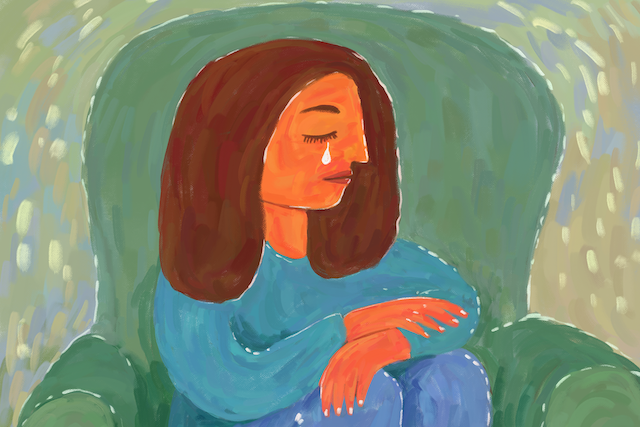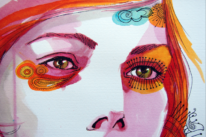
“In some ways suffering ceases to be suffering at the moment it finds a meaning.” ~Viktor Frankl
When life goes sideways, it can be hard to take one more breath, let alone find meaning.
Trust me. I know.
In the same year, I had breast cancer, chemo, radiation, and a divorce I didn’t want. There’s more to the story (there always is), but in essence, I lost everything—my health, my love, my home.
During all of this, I lost sight of myself, quit trusting myself. I was sure I was to blame for everything.
At the same time, within twenty-four hours of leaving the house I loved, six friends had given me the keys to their houses, telling me I always had a place to stay. My family showed up for me in ways that had me weeping.
Also during this time, I had two powerful dreams and one still small voice—these three messengers told me the very things I needed to hear to go on.
My first dream involved someone cooking something delicious in a kitchen. I couldn’t eat what she was making, because taste often goes awry with chemo, but I remember the cook saying, “Honey, there’s more sugar than salt in this recipe.”
In other words, life’s sweetness would return. Just give it time.
The second dream I had is that I dropped deep into the earth where every last bit of me was burned away. All that was left was a fierce and shining bone.
This dream promised me that there was something deep inside that was indestructible, and it had everything to do with fierceness and light.
And that still small voice? No matter what was happening, deep inside there was this wise and quiet Me who refused to let me be hurt anymore. What do I mean by that?
I knew I needed something to help me survive, but this grounded Me knew I needed to be intentional about how I chose to survive. Because I wanted to make myself better, not worse.
I began to write and record mini-meditations. I called them “A Hit of Hope.” A friend told me that the best place to record was in a closet, so there I sat, on top of my shoes, talking into my phone—using my voice and my words to name my pain and to convince myself that things would get better.
Any human being will have pain and trauma. Any human being will have things happen to them that they would rather avoid. But as long as we are alive, we can know that life will go sideways. In big and small ways, we will suffer. So as much as it pains me to say this, why suffering happens is irrelevant. The only question we can answer for ourselves is how we will choose to be in the midst of pain and suffering.
While there are still days when the bus of emotions can run me down, and while I have made more than my fair share of missteps in my recent journey, I have learned a few things along the way.
1. When there are big, and out-of-control life events, radical self-love and emotional recovery are the first order of business.
When you are hurting, put down the metaphorical gas can or salt or knives. Don’t make the fire any bigger or the wounds any deeper than they already are.
What do I mean by that? Make choices that keep your head clear, choices that keep your body and spirit safe.
For instance, a friend of mine, who was going through a divorce at the same time, was told by his best friend, “Just get roaring drunk, and stay that way for three months.” While that might help numb the pain, that kind of behavior would only create more problems in the long run. It would be far more healing to embrace journaling, yoga, or some other form of self-care.
Also, even if you messed up, don’t beat yourself up. Can you admit to how you contributed to the situation? Absolutely, but think of yourself like a kid on the playground. More scolding and finger wagging usually does little to help the situation. Often, it’s a big ol’ hug that is needed to stop the tears. So, get centered, get settled, and heap loads of love on your hurting self.
2. You get to feel every ounce of what you are feeling.
Do not be ashamed of your feelings. A Buddhist concept relates to this: first and second darts. The first dart is the emotion (sadness, fear, anger), and because we are human, it is right and good to let those emotions flow through us.
The second dart is our reaction to our emotion. Why do I always do this? If I were a better person, I’d… You know the drill. Feel your feelings, so that they can rise up and flow away, leaving you calm and clear.
3. There is no time to lose, but there is no need to hurry.
What in the heck does that mean? That bold statement doesn’t mean you should fly into manic or panic mode, but there is nothing like a life-threatening illness to remind a person that this now matters. In fact, this is the only now you are assured of getting. “You never know what’s coming,” a friend often says.
The idea is to live each day fully. To make the small choices, the day-to-day decisions that bring you the most joy, the most delight. This might mean starting that novel or business, calling that friend you’ve been missing, getting on your bike or yoga mat, or climbing that mountain and yodeling until the grizzlies roar back in response.
Simply put, there is not one day, one decision that will magically poof us to the good life for the rest of time. There are the small choices that add up—and either bring us toward more wholeness or continue to tear us to bits.
4. Meaning is what helps us to survive.
This last one is something Viktor Frankl, a survivor of four Nazi death camps, pointed out. In the worst of the worst, it can feel almost impossible to find meaning, but doing so is essential. It’s here that the why matters.
When life assails, it can be easy to ask, “What’s the point?” To feel adrift. Untethered. Rocked this way and that by wind and wave, all threatening to pull you under.
You have to find your why, your meaning, your sense of purpose or intention. What can you—you—do that makes life feel fuller, richer, more vibrant and alive?
For me, it was helpful to think about active verbs. I wanted to move, create, heal, serve.
What did this look like? I would work out each morning, because that helped me to feel strong in my own body. Then I would sit down and write my meditations, getting lost in the joy of doing something creative. This process not only healed my own struggling spirit, but I hoped it might do so for others. When I posted them, I did so with the intention of letting them serve others.
If you have a hard time finding your own sense of meaning, take a look at your life. What do you do that makes you lose time, something you get lost in? That’s often a great indication of what brings you meaning. Or what is something you do that makes you feel better when you are done? How can you incorporate that into your life more?
If you are still struggling, ask a friend to help you brainstorm. Or take a walk, and let your mind wander along with your feet. Your spirit often just needs some time, space, and quiet to speak deeply to you.
This might sound like fluffy advice, but it’s not. As Frankl famously said, “He [or she or they] who has a why to live for can bear almost any how.”
To be clear, this isn’t easy, nor does it happen in a day, a week, a month, or even a year. But create the right conditions and good things are far more likely to come.
Last week, I happened to be sitting on my front porch. When I got up to go inside and make myself tea, I noticed my orchid in the front window.
A friend gave it to me before I started chemo. Every morning, I look at it as I sit inside and write, but this was the first time I’d seen it from the outside. From this new perspective, I could see a gathering of buds, pressed up against the window, the direction from which the light comes.
The soon-to-be blossoms were hidden entirely by the pot and the leaves when I sat inside in my leather chair.
That orchid offered me a message, just like my dreams. Those flowers showed me a deep and profound truth: sometimes, the blossoming is on the other side.
About Betsy Johnson
Betsy Johnson teaches English and Communication at a small liberal arts college in Minnesota. Her A Hit of Hope meditations can be found on Insight Timer. You can also subscribe to her newsletter here. Betsy is also a seasoned and quirky yoga teacher, and you can check out her yoga website here. You can email her at betsybeingbetsy@gmail.com













 Though I run this site, it is not mine. It's ours. It's not about me. It's about us. Your stories and your wisdom are just as meaningful as mine.
Though I run this site, it is not mine. It's ours. It's not about me. It's about us. Your stories and your wisdom are just as meaningful as mine. 